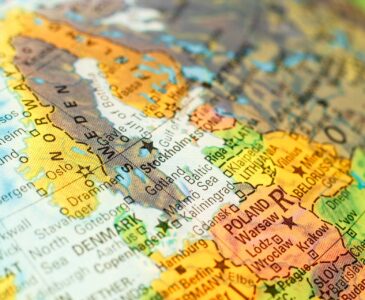There are more than one hundred countries in the world, so finding a new one might be challenging even if your zodiac sign is not libra. But if you fancy some good beer, fast cars, and punctuality is not an issue for you, then international moving to Germany might be just the right thing to do. Our guide brings everything an American moving to Germany should know, so stay tuned for some useful information.

Located in Western Europe, this country consists of 16 federal states, all very different and unique. While most expats are concentrated in Berlin, there are so many other cities offering great opportunities for internationals looking to settle down. Give other cities such as Frankfurt, Munich, or Hamburg a chance, and you’ll see how diverse and interesting these places are.
Why Are Americans Moving to Germany From the US?
Although relocating overseas is exciting, starting a new chapter on another continent often comes with many obstacles you’ll need to overcome on your road to becoming an expat. Making such big decisions is never easy, whether you’re relocating to another country for love, work, or something else.
According to available data, around 182,000 American immigrants live in this European gem and numerous expat communities online where you can read about their first-hand experiences. There are many factors that made Germany one of the best places for living overseas, so here are only some of the most important reasons for relocating across the world to this place:
- Favorable economy,
- Prime healthcare,
- Numerous job opportunities,
- Free university education.

How to Move to Germany From the US and Qualify for Their Residence Permit
If moving to Germany from the USA and living overseas is in your plans, then forget about reading travel guides and start thinking about how to organize documents needed to travel abroad because German bureaucracy is on another level. However, don’t let relocation stress get you yet, because it is all well explained, and if you follow all the steps, you’ll be just fine. That’s another thing you’ll notice, they are very organized, and everything goes by the book, so it is better not to try to go around the rules.
Can I Just Move to Germany, or Do I Need a Visa?
American citizens who don’t have a visa can stay in the country for 90 days, so if you’re looking to stay and eventually start working, you’ll need a visa to do it. Prepare yourself that the process is a long one, so start on time, a few months in advance. The German immigration system is very restrictive, so make sure you follow all the steps and have all the papers ready. The best would be to include these things into your checklist for relocating abroad, so you don’t forget something important.
What Documents Do You Need to Apply for a Visa From the US?
The German embassy is located in Washington, but besides there, you can submit your application to any other consulate in the US. You have to book the appointment online and prepare these documents:
- Valid passport with at least 2 blank pages,
- VIDEX – application form,
- One passport photo,
- Cover letter explaining the purpose of your stay,
- Travel health insurance,
- Proof of financial subsistence,
- Proof of accommodation.
Who Is Eligible to Apply for a German Residence Permit?
The standard residence permit allows foreigners to stay for a limited amount of time, but it can be extended and eventually lead to a permanent residence. Anyone who is coming for work, education, to attend training courses, or for the purpose of a family reunion can apply for a residence permit.

Can I Move to Germany Without a Job?
If you’re wondering how to get a job in Europe as an American, know that that might be easier than you expect. However, if you want to relocate and don’t have a job position waiting for you, you can technically still do that since Americans can apply for a visa from Germany as well. Just keep in mind that you have 90 days to find a job since that’s how long you can stay in the Schengen zone without a visa. Prepare all relocation-related questions to ask your employer when you go to an interview since they need to be familiar with your situation.
What’s best about working in this country is that, on average, workers have 30 days off per year, and there are 9 to 13 public holidays, depending on the state you live in. Another way to relocate, if you don’t have a contract waiting for you, is to enroll at a German university. Except for a symbolic semester fee, there are no other tuition fees, the offer of scholarships is vast, and the quality of education is on a high level.

Cost of Living in Germany VS the USA
Generally speaking, living in the US is more expensive in terms of housing, education, and healthcare, so relocating this far can actually be very economical. Since most people consider relocating to Berlin, you should keep in mind that the capital city is the most expensive one. According to Numbeo, a family of four would need around $3,200 per month, without the rent. On the other hand, a single person spends around $940 per month. In other cities, especially smaller ones, the costs of living are significantly lower. Take a look at this video to get a glimpse of some random expenses.
How Much Money Do You Need to Move to Germany?
Relocations are never cheap, especially international ones. However, investing in some extra services such as renting storage or getting a professional packing service might save you a lot of time and nerves. The costs of moving internationally and shipping overseas will mostly depend on what you pack to move abroad. Consider selling some bulkier items to avoid oversized freight and bring only essentials.
There’s no need to ship your car since you’re relocating to a country that is home to some of the most popular car brands such as Mercedes, BMW, Porsche, Audi, Volkswagen, and many others. But still, overseas vehicle shipping is an option if you want to bring your beloved vehicle abroad.

Opening a Bank Account, Notorious Taxes, and Insurance
Having a bank account is a must in order to function, and most banks will require you to have a registered address to open an account. Except for N26, they require just a local phone number, so that is a somewhat simpler solution and a great option for expats. Also, it all goes online. Most banks charge monthly fees no higher than $6-7, so it won’t harm your budget.
How High Are the Taxes?
This country has the so-called progressive tax system, which means that the higher your tax bracket is – the higher taxes you’ll have to pay. Keep in mind that most people with average income fall into the second category with a 42% income tax rate. There are some benefits for couples, and of course tax refund. That’s where things can get complicated, so even locals rely on tax advisors (Steuerberater) to help them get more money back. One more thing to be aware of is that they have the Church Tax, which you can avoid paying only if you officially leave the church, and that will cost you around $30.
Is Health Insurance Mandatory?
Yes, having health insurance (whether it is private or public) is absolutely mandatory. Once you get your residence permit, you can choose whether you want to register at one of many public insurance providers or you’ll opt for private healthcare. So you can’t avoid it, but this is one of the best healthcare systems in the world, so it is worth every cent you invest in it.

Do I Need to Learn German?
Jein, that is, yes and no. The thing is, it is not so hard to find a job as an English speaker, but keep in mind that learning a new language abroad can bring you many more opportunities. Breaking the language barrier might be tough at the very beginning since learning German is not easy, so be patient and follow our tips for learning a new language.
You can always get an online course or rely on an app to learn some basic words, for starters. Another way to familiarize yourself with the language is to listen to their music. Although you might think that is not the most melodic language since it can sound quite aggressive, the music might prove you wrong, so give it a chance.
Is Living in Germany as an American Difficult?
Not at all, especially if you put in some effort to learn the language, but even without it, you’ll be just fine since English is widely spoken. Most US expats choose Berlin as their home, but even if you’re relocating to Munich, you’ll be able to find comrade expats. Still, there is one thing to be aware of, and that is the cultural shock that you might experience. We mentioned earlier how punctual Germans are and how complicated their bureaucracy is, but that is not all. Here are some just German things you should prepare yourself for:
- Everyone plays football,
- Most stores are closed on Sunday,
- Their sense of humor is a bit odd,
- They tend to stare at other people,
- On most highways, there is no such thing as speed limit,
- They take recycling very seriously.
For more information on some typical things that you should be aware of, take a look at this video and get to know some things that might annoy some Americans.
How to Know What City Is the Right One?
This country is one of the best places to live in Europe, so wherever you go, you’ll hardly make a mistake. Still, since the country is so big, there are some differences in mentality, costs of living, and other things you should consider. So, start researching different places on time to pick the best one for you. Here are some of our suggestions to keep in mind:
- Berlin – The list could hardly exist without Berlin in it. Some love it, others hate it, but the truth be told, it is probably the most expat-friendly city, very laid back, and the least German one. It offers numerous job opportunities and amazing nightlife.
- Frankfurt – If you work in finances, you will feel like a fish in the water here since this is one of the world’s most important and biggest financial centers. High quality of life, cleanliness, and high salaries make Frankfurt very appealing for young professionals looking to excel in their careers or just add international work experience into their resumes.
- Munich – Although it is often referred to as the most expensive place, Munich is home to many students and young professionals. It is one of Europe’s brewing capitals and home to the famous Oktoberfest. Besides beer, Munich has beautiful architecture, nature, it is very walkable and safe.
- Stuttgart – Although it is mostly known by the fact that successful car brands Mercedes and Porsche have their headquarters here, Stuttgart is one very interesting place to live in. It is spread over several hills, some of which are covered in vineyards, and it is close to the Black Forest.

In the End, Is Moving to Germany a Good Thing to Do?
So what do you think, is this the best European country to live in or not? We think it might be worth the adventure called international relocation. Whether going overseas is something you always dreamed of or it never crossed your mind before, leaving your comfort zone brings so many benefits that we are sure there will hardly be any cons on your list. Another significant advantage is that you’ll be able to explore entire Europe much easier since wherever you settle down, you’ll have trains, buses, and flights, connecting you to different parts of Europe. So, wake up your inner wanderlust and start packing.














